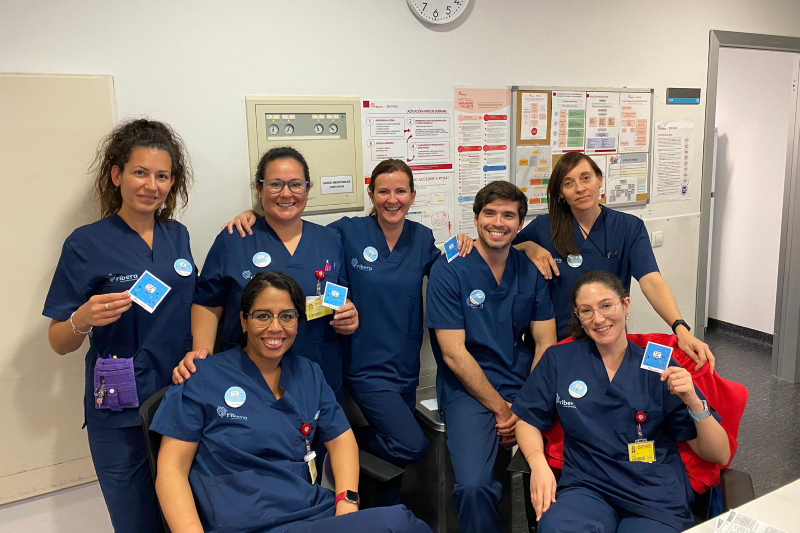
by mgisbert | Oct 3, 2024 | Ribera |
- It is the only healthcare group among the more than 400 companies that have participated in the analysis carried out by Actualidad Económica, with objective data on people management, the working environment, work-life balance and flexibility.
- Only two Valencian companies, including Ribera, appear in this prestigious ranking, which is updated every year according to very demanding criteria.
The Ribera healthcare group is once again positioned among the 100 best companies to work for in Spain, according to the Actualidad Económica El Mundo ranking. Ribera is the only healthcare group to appear in the top 100 of this barometer, which annually analyses and scores specific actions, resources and people management policies of the companies that submit their reports for objective evaluation.
Only two Valencian companies appear in the top 100 of this analysis, which is updated every year using very demanding criteria.
The Ribera Group’s Human Resources Department assures that “the well-being of the great team of professionals who work with us is fundamental and that is why we strive every day to foster a culture of growth, collaboration and care and thus, together, continue to build our model of responsible health”.
Furthermore, they explain that the consolidation of the Ribera health group in this ranking “encourages us to continue working every day and is a recognition of the effort and commitment of all professionals, whom we would like to thank for making our company an exceptional place to work”.
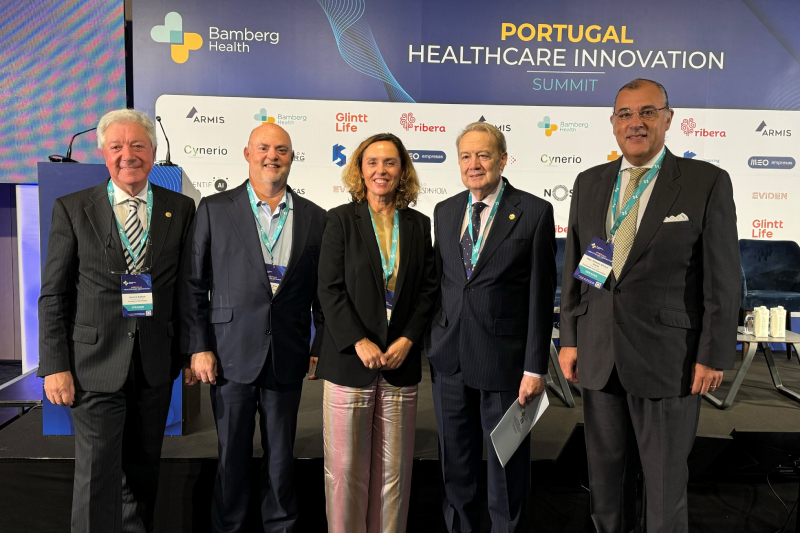
by mgisbert | Sep 26, 2024 | Ribera |
- Alberto de Rosa, president of the healthcare group, talks about the challenges facing European healthcare systems and the need for reforms to provide valuable solutions for citizens.
- The Portuguese Council of Ministers approves a decree by which the Cascais Hospital will be responsible for the primary care of 75,000 citizens. This is a step towards an integrated health management model and the transformation of the system.
The Ribera healthcare group and Cascais Hospital presented their responsible and sustainable healthcare model at the Portugal Healthcare Innovation Summit, which took place yesterday in Lisbon and was attended by prominent leaders from the Portuguese Ministry of Health and the Portuguese National Institute of Health.
The president of the Ribera group, Alberto de Rosa, and the managing director, Elisa Tarazona, spoke at the conference as representatives of the company that was awarded the management of the Cascais Hospital a year and a half ago, and focused their presentations on the integrated, participative, predictive, personalised and innovative management model of Ribera, which currently has 13 hospitals, including Cascais, as well as some fifteen primary care centres and 60 clinics.
De Rosa, in particular, focused his speech on the challenges facing European healthcare systems, such as waiting lists, ageing, the increase in chronic pathologies, the lack of professionals and the essential technological and clinical innovation to improve patient care and monitoring.
New management in Cascais Primary Care
The Portuguese Council of Ministers last week approved a decree by which the Cascais Hospital will be responsible for the primary care of 75,000 citizens. This decision is a step towards a model of integrated health management and the transformation of the system.
In this context, Alberto de Rosa spoke of the necessary reforms that governments in Europe should adopt in order to “commit to integrated healthcare, reduce bureaucracy in healthcare and improve flexibility in the management of people, regardless of the management model”. De Rosa gave as an example the courage and good work of the Portuguese health authorities. “Portugal is an example in the introduction of health reforms and is advancing in an integrated health model, in which Ribera is a pioneer in Europe, has been a reference for more than 25 years and is also a case study at Harvard, thanks to its good health results”.
Alberto de Rosa and Elisa Tarazona were joined at the forum by the Chairman of the Board of Directors of Cascais Hospital, José Bento, and the Director of Innovation of this health centre, Dulce Cachata, as well as representatives and management managers from the main hospitals, organisations and health institutions in Portugal.
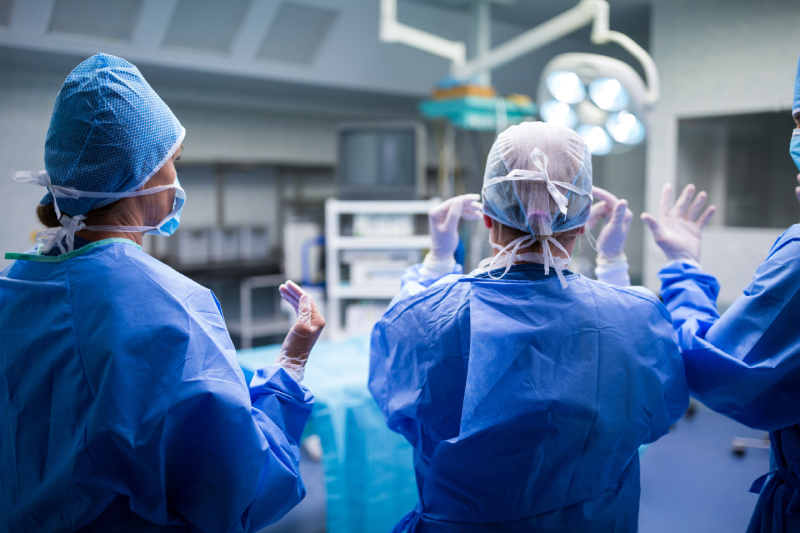
by mgisbert | Sep 13, 2024 | Ribera |
- The aim is to contribute to improving people’s quality of life and to share information between organisations committed to prevention, prediction, equity and sustainable development.
The Ribera Salud Foundation has signed up to the “One Health” strategy.One Health“strategy to promote “a global vision of health”, as explained by its director, Mercedes Gozalbo. The Ribera Salud Foundation frames this adhesion within the framework of its own model of responsible health and that of the Ribera health group. Specifically, the foundation aims to “contribute to the improvement of integral health, quality of life and well-being of people, and responds to the Ribera group’s social commitment to the current and future population”.
“One Health is a global initiative that aims to increase communication and interdisciplinary collaboration in the health care of people, animals and the environment, understanding that there are many factors that influence public health care and the well-being of the world’s population. “The One Health strategy is aligned with our mission at the Foundation and the Ribera Group, to try to prevent, predict, detect and respond to the greatest possible number of threats to the health of citizens, to help reduce inequalities with our support for vulnerable groups, and to promote sustainable development,” explains Mercedes Gozalbo, also the group’s Director of Research.
In fact, this initiative, promoted by the Food and Development Organisation of the United Nations (FAO), the World Health Organisation (WHO) and the World Organisation for Animal Health (OIE), encourages institutions, health organisations, professional associations and universities to work collaboratively, to address population health challenges from a holistic point of view, considering not only the interrelationship between population and animal health, a key aspect following the emergence of viruses that have given rise to epidemics and this pandemic, but also all the factors that influence it.
“Health, economic, social and cultural conditioning factors have an important influence on the organisation and planning of resources, prevention and health care for the population,” explains Mercedes Gozalbo, who stresses the importance of sharing information in order to “be able to find the most efficient solutions to the health challenges that society poses to us,” she adds.
Many organisations in Spain have joined this global initiative, including the Ribera Salud Foundation, which takes over from the Ribera Group, which joined this forum in 2021, before the foundation was set up. Among other organisations, these include the General Council of Nursing in Spain, the General Council of Pharmacists, the General Council of Veterinary Associations, the Spanish Medical Association, the General Council of Medical Associations, the National Conference of Deans of Nursing, the National Conference of Deans of Pharmacy Faculties in Spain, the National Conference of Deans of Medical Faculties and the Conference of Deans of Veterinary Faculties in Spain.
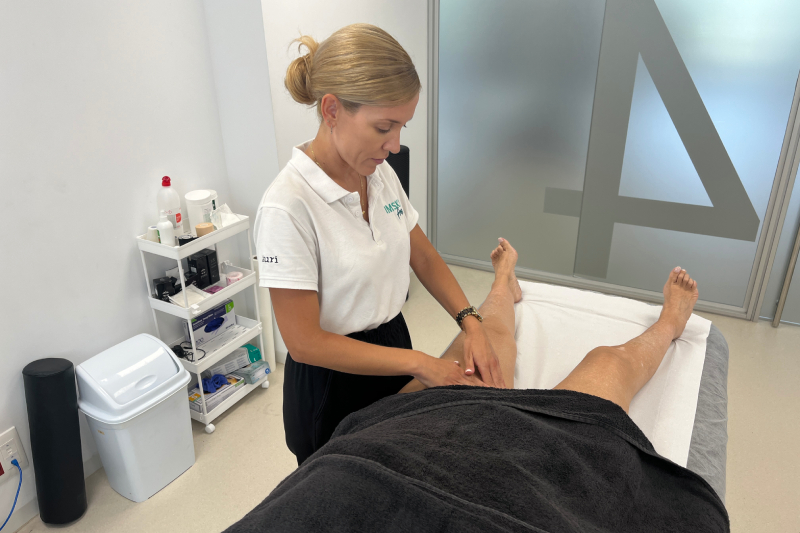
by mgisbert | Aug 29, 2024 | Ribera |
- Oncological physiotherapy improves the quality of life of people undergoing treatment or recovering from surgery: it facilitates pain relief, increases mobility and reduces fatigue.
- The new specialist at the health centre specialising in musculoskeletal pathologies explains the benefits of the therapy to recover muscle mass, which she recommends starting “as soon as possible”.
The Ribera IMSKE hospital has expanded its physiotherapy service with a specialist in oncological physiotherapy, Isabel Gay Fernandez de Córdova, who helps these patients to recover muscle mass, mobility and general physical fitness, which results in an improvement in their quality of life and mood.
“Physical rehabilitation is very important during and after cancer, both in cases where there is surgery and in cases where there is not, because in general, patients move less, their muscles atrophy and they lose weight,” explains the specialist, who recommends starting oncological physiotherapy routines “as soon as possible”. “Even if the patient is receiving chemotherapy, we adapt the guidelines to the needs of each patient and physical exercise has been confirmed as very positive in all cases,” she adds. Other benefits include pain relief (because it boosts the endocannabinoid system), reduction of fatigue and muscle loss (sarcopenia), as well as other side effects of chemotherapy or hormone treatment, such as nausea. It also reduces the risk of osteoporosis and venous thrombosis and, in general, improves the quality of life, well-being and independence of cancer patients, which contributes to increased self-esteem and social relationships. “When the patient feels stronger, feels better physically and is more willing to do things,” says the physiotherapist.
Different studies have also shown that in chemotherapy treatments, there are very positive results in patients who carry out scheduled therapeutic exercise of medium intensity, with less toxicity and greater effectiveness in the treatment itself. “Cancer cells feed on little oxygen. That is why the more time an oncology patient spends on the couch, the worse it is. And with sport, you oxygenate the cells,” he explains. Specifically, specialists recommend doing strength exercises (for example, with weights or rubber bands) and combining it with aerobic exercise (walking, cycling or swimming) and stretching. The Ribera IMSKE hospital has 1,350 square metres dedicated exclusively to patient rehabilitation, as well as a hydrotherapy pool of 45 square metres and three levels of depth.
Isabel Gay Fernandez de Cordova explains that she often works with patients with limpedema, lymphoedema and pathologies related to the lymphatic system, but also with patients who have undergone surgery and need to recover all or part of their reduced or lost mobility due to rest or the surgery itself. “Thanks to the facilities and the super-specialisation of the professionals in the different areas of this hospital, at Ribera IMSKE we can carry out very specific routines that are impossible to do in other health centres,” explains Isabel. The oncology physiotherapist works in coordination with the team of nutritionists and rehabilitation doctors to offer comprehensive care to these patients.
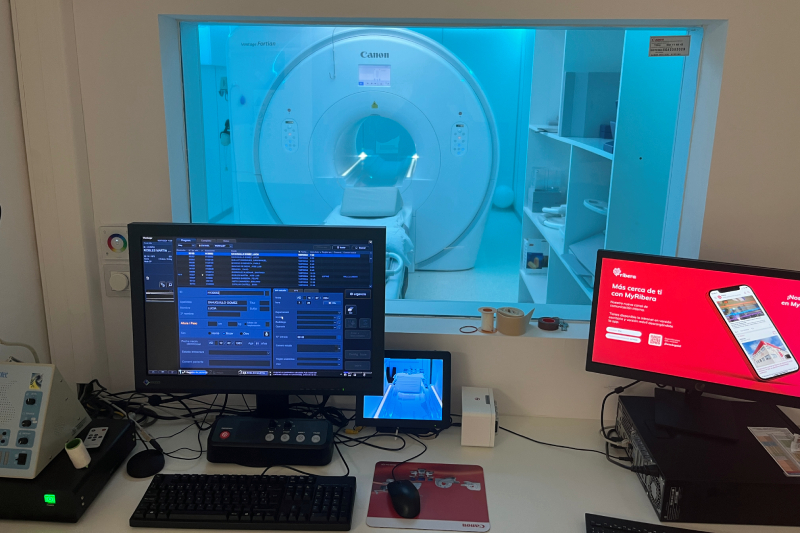
by mgisbert | Aug 22, 2024 | Ribera |
- The health centre specialising in musculoskeletal pathologies has a robotised X-ray room, a high-definition ultrasound scanner, a multi-slice CT scanner, dual energy densitometry (DEXA) and two MRIs of 1.5 and 3 teslas.
- Ribera IMSKE’s Radiodiagnosis Service is committed to personalised and highly specialised medicine in the prevention, diagnosis and treatment of injuries to the locomotor system.
The Ribera IMSKE hospital has incorporated a new high-end 1.5 tesla MRI scanner in its Radiology area, in addition to the 3 tesla MRI already in use at the hospital. In addition, the hospital now has a dual energy densitometry (DEXA), which in addition to bone mineral density, allows the measurement of body mass index and body fat. In this way, as Dr. Eva Llopis, head of Radiodiagnosis, explains, “we can offer patients personalised and highly specialised medicine, with the best technology for the prevention, diagnosis and treatment of injuries to the locomotor system”.
The Ribera Group’s health centre in Valencia, which specialises in musculoskeletal pathologies, has a robotised X-ray room, a high-definition ultrasound scanner and a multislice CT scanner, in addition to the two MRI scans and densitometry mentioned above. With regard to the two MRI scans available at Ribera IMSKE, the head of the Radiodiagnosis service explains that the difference between the two lies in the size of the magnetic field (1.5 or 3 teslas, the unit of magnetic field in the International System), which allows the technology to be adapted to the needs of each patient. “The larger the magnetic field, the more complex the sequences are and the more precision it offers. But at the same time, the more sensitive it is to any metal parts or small shrapnel, as well as to the patient’s movement,” he says. That is why, he adds, “one or the other is not better, it depends on the patient’s needs”. For example, he explains, to check a knee or hip prosthesis, the image quality of the 1.5 tesla MRI is better.
Another of the additions to the Radiodiagnostic Service of the Ribera IMSKE hospital is dual energy densitometry (DEXA), an equipment that has evolved a lot in recent years. In fact, it emerged as a tool for measuring bone mineral density and for diagnosing and monitoring pathologies such as osteoporosis, which reduces bone mass density and is the cause of many fractures in the elderly. Furthermore, it has been considered by the World Health Organisation (WHO) as the great epidemic in developed countries.
The Ribera IMSKE DEXA densitometry model allows, in addition to measuring bone mineral density, to determine the body mass index and fat distribution, both considered risk factors in serious diseases such as obesity or cardiovascular pathologies, while assessing and controlling changes in muscle mass or lean/fat mass in different areas of the body, associated with physical exercise, rehabilitation or sports training.
The information provided by this densitometry is of great practical value for monitoring and optimising, for example, an athlete’s training plan to achieve maximum performance. It also contributes to a complete evaluation of the patient and helps healthcare professionals to monitor the evolution of the established treatment or therapy, diet and/or exercise with objective and complete information.

by mgisbert | Aug 9, 2024 | Ribera |
- The healthcare group highlights the 13% reduction in its carbon footprint and the use of more than 80% of electricity in its centres from 100% renewable sources, as well as the development of the Ribera Life programme to care for the physical and emotional health of its professionals.
- The document, already published on its website, sets out its commitment to growth and diversification in the past year, as well as the main healthcare and research milestones, investment in technology and innovation, its plans for humanisation and healthcare activity, among others.
The healthcare group Ribera has just published its Sustainability Report for the 2023 financial year, in which it highlights, among other things, the important advances achieved in its environmental policy, internal social benefits, governance policy, growth and diversification, main healthcare and research milestones, its commitment to technology and innovation, as well as the major figures of its recent activity.
Ribera is aware that sustainable development is linked to environmental protection and pollution prevention, so it has an Environmental Policy that is applied in all its areas, and which promotes initiatives and technologies that encourage more sustainable practices. These actions include the installation of photovoltaic solar panels, the implementation of devices to reduce energy consumption, the updating of equipment to improve its efficiency, and the training of professionals in the efficient management of resources, among other measures. Thus, by 2023, more than 80% of the electricity consumed will be of 100% renewable origin and its carbon footprint will have been reduced by 13%. In addition, last year a corporate sustainability manager was appointed and the group’s Sustainability Committee was set up.
With regard to social issues, Ribera once again opted for a people management policy that prioritises the well-being of its professionals. For Elisa Tarazona, CEO of the healthcare group, “we need to count on healthcare professionals, facilitate their continuous training and personalise working conditions with flexibility to attract and retain talent”.
Its Sustainability Report highlights the Ribera Life programme, which reflects Ribera’s integral commitment to its employees, thus contributing to an organisational culture that improves the quality of life of its professionals and generates a working environment in which they feel valued and happier. To achieve this well-being, the group works on different initiatives under five dimensions: physical and emotional health, professional health, financial health, team health and social health.
Among other milestones, the number of permanent contracts grew by 5% and by the end of 2023, nearly 90% of the group’s professionals had this type of contract. Work-life balance, diversity, equality policies and training are very important aspects in the management of people in the healthcare group: flexibility, adaptation of working hours and reduction of working hours, multiculturalism (there are professionals of more than 59 nationalities), equality (the number of female managers has increased by more than 12% compared to 2022 and the number of female professionals now accounts for 72% of the group) and training hours, which have increased by more than 18% compared to the previous year, with special programmes on the prevention of harassment and gender-based violence. For all these reasons, the healthcare group has once again entered the ranking of the 100 best companies to work for in Spain, published annually by a specialised media.
The Ribera Group’s Sustainability Report also lists its main operations and results, highlighting the incorporation of the Cascais Hospital, the group’s first healthcare centre in Portugal, the Cardiosalus group of clinics in Murcia and the Ciudad Quesada clinic in the Torrevieja area. It also highlights the more than 25 million invested last year in technology and infrastructure, as well as the strategic agreement signed with Microsoft to promote innovation and artificial intelligence, and the implementation of new CAT scans and magnetic resonance imaging in several hospitals, as well as healthcare and research milestones with the expansion of healthcare services in its hospitals in Galicia and Murcia, the internal assumption by Ribera Lab of the management of the integral biological diagnosis of the Vinalopó and Torrejón areas and the opening of a new psychiatric hospitalisation plant at the University Hospital of Torrejón, among others.
The healthcare group also highlights in its annual report the implementation of outstanding actions by the Ribera Salud Foundation to promote healthcare research and the launch of the Innovation Health Center at the Cascais Hospital, as well as the numerous awards received throughout the year.
In terms of humanisation and patient experience, once again this year the meetings of the patient advisory councils in most of the Ribera centres to listen to and attend to their needs, the remodelling of spaces and initiatives such as the outdoor walks for ICU patients and the Ritmos de Vida programme, which combines music and health, stand out.
Special mention should be made of the health promotion plan and collaboration with entities, which organised more than 200 activities last year, with workshops, conferences and exhibitions, the celebration of world days and the publication of informative material. The RDV campaign, with the manufacture of the first arrhythmic metronome to prevent cardiovascular diseases, toured the Group’s main hospitals, and the 7th edition of the Cervantes Route at the University Hospital of Torrejón brought together thousands of walkers along the Henares Corridor, promoting healthy lifestyles. Group professionals have participated in this programme as a corporate volunteering activity, as well as with the Discamino Association, which helps people with disabilities to walk the Camino de Santiago, and with Casa Caridad and Vida Digna, among other entities. As Elisa Tarazona points out, “we are committed to health promotion and disease prevention as an essential aspect of our sustainability policy in order to address health in all its aspects in a comprehensive manner”. Consult the Report here.







Recent Comments